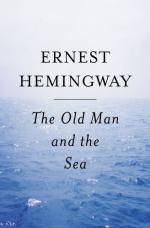|
This section contains 3,668 words (approx. 13 pages at 300 words per page) |

|
SOURCE: "Hemingway and Old Age: Santiago as Priest of Time," in College English, Vol. 27, No. 3, December, 1965, pp. 215-20.
In the following essay, Cooperman considers The Old Man and the Sea a "poem of reconciliation to the meaning and nature of age," maintaining that Hemingway fails to view old age in any other terms but through the values of pride, sacrifice, and endurance, and as a hardening rather than a softening of the qualities found in youth.
The preoccupation of Ernest Hemingway with individual courage, will, and endurance—the need for self-contained action, ritualized form, precision of motion (and emotion), and—perhaps most important—the fear of complex motivation and the insistence upon the absolute necessity for initiative as a definition of manhood—was seriously threatened in the years preceding and following World War II.
The period before the war was a time of political ambiguities, a time which...
|
This section contains 3,668 words (approx. 13 pages at 300 words per page) |

|


